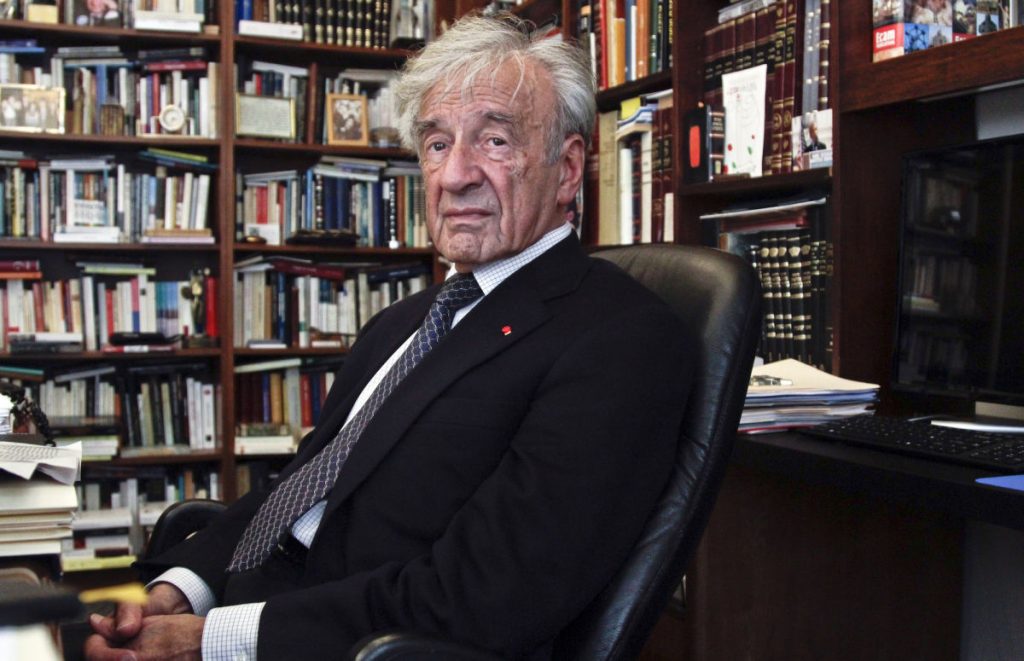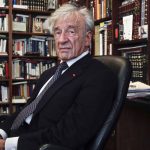
“The opposite of love is not hate, it’s indifference. The opposite of beauty is not ugliness, it’s indifference. The opposite of faith is not heresy, it’s indifference. And the opposite of life is not death, but indifference between life and death.” –Elie Wiesel
“Elie Wiesel, the Auschwitz survivor who became an eloquent witness for the six million Jews slaughtered in World War II and who, more than anyone else, seared the memory of the Holocaust on the world’s conscience, died on Saturday at his home in Manhattan. He was 87.
Menachem Rosensaft, a longtime friend and the founding chairman of the International Network of Children of Jewish Holocaust Survivors, confirmed the death in a phone call.
Mr. Wiesel, a charismatic lecturer and humanities professor, was the author of several dozen books. In 1986, he was awarded the Nobel Peace Prize. But he was defined not so much by the work he did as by the gaping void he filled. In the aftermath of the Germans’ systematic massacre of Jews, no voice had emerged to drive home the enormity of what had happened and how it had changed mankind’s conception of itself and of God. For almost two decades, the traumatized survivors — and American Jews, guilt-ridden that they had not done more to rescue their brethren — seemed frozen in silence.
But by the sheer force of his personality and his gift for the haunting phrase, Mr. Wiesel, who had been liberated from Buchenwald as a 16-year-old with the indelible tattoo A-7713 on his arm, gradually exhumed the Holocaust from the burial ground of the history books.
It was this speaking out against forgetfulness and violence that the Nobel committee recognized when it awarded him the peace prize in 1986.
“Wiesel is a messenger to mankind,” the Nobel citation said. “His message is one of peace, atonement and human dignity. His belief that the forces fighting evil in the world can be victorious is a hard-won belief.”
By Joseph Berger /The New York Times
Elie Wiesel, who died July 2nd, wrote fifty-seven books, yet the obituaries and tributes refer to him more consistently as a witness than a writer. His moral authority, which he earned and sought, derived from his experience, not any literary virtuosity, though the spare, confessional prose of his most widely read books—his ability to remember suffered details, and describe their shock on a thinking, pious youth—gave his testimony popular momentum. “Night”—his early masterpiece from the fifties, which eventually sold in the millions—famously recounted how a child was hanged before all in Wiesel’s death camp, slowly suffocating, too light to break his own neck: “Behind me, I heard [a] man asking: ‘Where is God now?’ And I heard a voice within me answer him: ‘. . . Here He is—He is hanging here on this gallows.’ “ In “One Generation After,” a memoir published in 1970, he writes of the former head of a yeshiva in Galicia, who bonded with him in Auschwitz. The teacher—who seemed to know the entire Talmud by heart—urged him to “preserve his soul” by studying with him:
“Isn’t the soul supposed to be immortal?” I asked innocently.
We were digging. He stopped, as if unwilling to hear his own words, and replied: “You will learn that this is neither the place nor the time to speak of immortality.” . . . In the end, resolution gave way and followed the body: weakened one like the other, one by the other.
A miserable crust of moldy bread came to contain more truth, more eternity than all the pages of all the books put together.”Elie Wiesel
Born in Romania, Wiesel was sent to the Auschwitz concentration camp in Poland with his family in 1944, before being moved to Buchenwald a year later. A decade after his liberation, his memoir “Night” recounted the horrors of the camps and the Holocaust.
Wiesel continued to write, eventually publishing more than 57 books. During an academic career, which included positions at Boston University and Yale, Wiesel continued to speak about his experiences and the dangers of apathy in the face of atrocity. He was awarded the Nobel Peace Prize in 1986. In 1988, he founded the Wiesel Foundation to “combat indifference, intolerance, and injustice.”… …
Quotes from an article of Bernard Avishai
Bernard Avishai is a visiting professor of government at Dartmouth College and an adjunct professor of business at the Hebrew University.


